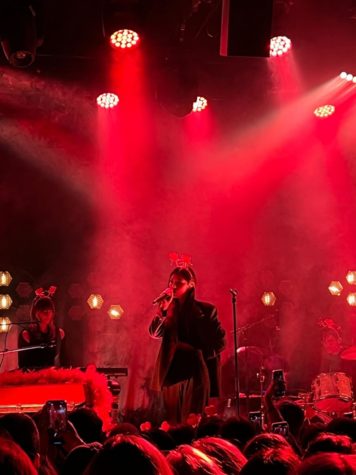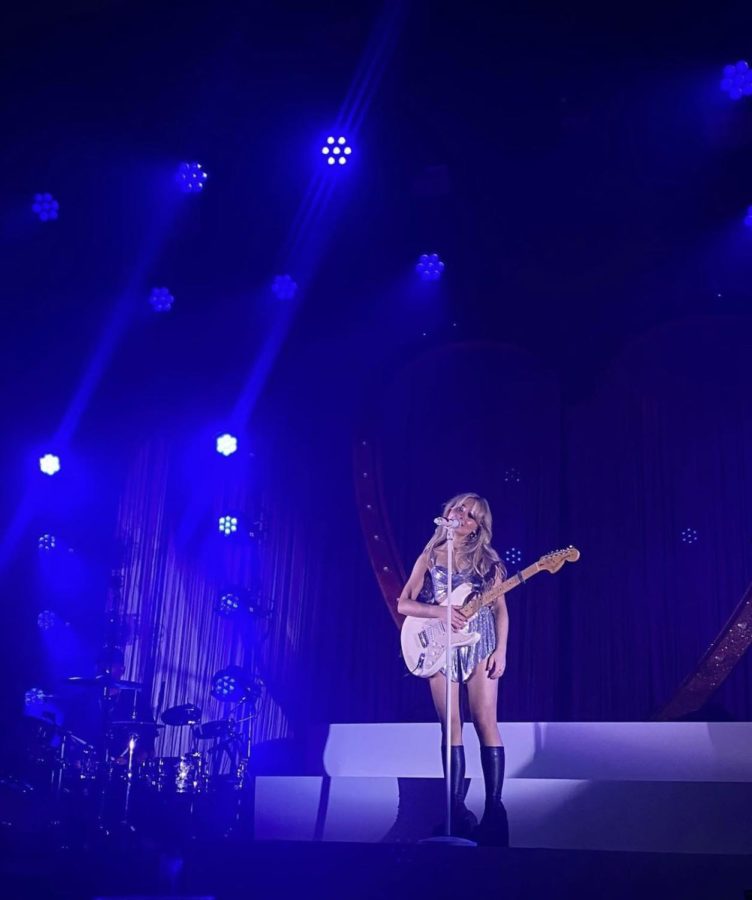A Guide to Everything Related to Attending Concerts
From buying tickets to staying safe while you’re there, this article is a comprehensive guide to everything related to attending concerts.
Sabrina Carpenter performs at Webster Hall in New York City on her “Emails I Can’t Send” Tour.
Everyone remembers their first concert. Mine was Gracie Abrams at the Mercury Lounge, a small venue in downtown Manhattan. When I got home, I told my mom, “My life has changed. I’m a new person now.” She thought I was being dramatic (which I probably was), but I felt elated after spending a few hours singing lyrics to songs that mean the world to me. Ever since then, I have tried to go to as many concerts as I can and cannot wait to go to more.
Avoiding Ticket Trouble
Buying concert tickets can be an extremely frustrating experience, but it all pays off when you realize you are going to see one of your favorite artists live. There are a few ways you should prepare for ticket sales. You should join the mailing lists of artists that you like and make sure to follow them on social media. Artists often update their fans about tour dates and ticket sales through social media. Less prominent artists sometimes post presale codes on their social media or send them to members of their email list. Headlining artists, like Taylor Swift and Ariana Grande, typically use Ticketmaster’s Verified Fan Presale and post links of where to sign up.
Verified Fan is Ticketmaster’s attempt to ensure tickets to popular artists’ shows end up in the hands of real fans, not scalpers who buy tickets in bulk to resell them at an inflated price. Artists post the link to sign up for Verified Fan when they announce their tours, and fans who participate will receive an email notifying them if they are invited to an exclusive Verified Fan Presale. If you are invited, Ticketmaster will then text you your code, if you are not invited you are put on a waitlist and will not get a code. If you do not get a code, you can still purchase tickets, you just have to get tickets at a general sale or from resellers. Presales are the first chance to buy tickets, so there are more options of where to sit, and tickets are usually cheaper than they will be for the general public sale.
Unfortunately, getting a Verified Fan Presale code does not guarantee you a ticket, due to the difficulty of acquiring tickets during sales. However, there are methods to raise your chances of securing them. Before the time of the sale, download the Ticketmaster app and enter your payment information into your Ticketmaster account. That way, once you choose your tickets on the venue map, you can buy them as quickly as possible. This is crucial because if you do not check out in the seven minutes Ticketmaster allows you, your tickets are released for others to buy.
On the day of, make sure you know the correct time that tickets will go on sale. Pay special attention to the location of the concert because ticket sales typically occur at local times. Ten minutes before the sale begins, join the waiting room on the Ticketmaster app. From then on, do not refresh your page, even when it comes time to be moved to the queue to buy tickets – the app will move you there itself. Simply press “join the queue” when the screen appears. Once you are on the “queue,” refreshing your page, exiting the browser, switching devices, or changing WiFis all may send you to the back.
Moreover, you want to be careful that Ticketmaster does not identify you as a bot and therefore prevent you from buying tickets. To avoid this, only attempt to buy tickets on one device, browser, and ticket window. Make sure you are free of distractions as you should try to buy tickets as quickly as possible because other fans, as well as scalpers, want them too.

Keep your code accessible at all times because Ticketmaster may ask you for your code during checkout. Make sure to also have the device that Ticketmaster texted you your code on handy when buying tickets because Ticketmaster frequently asks you to verify your account by texting a code to the phone number associated with your account.
If you did not get tickets at a Verified Fan Presale, do not lose hope. Artists often add extra shows to tours and there are always general “onsales.” Plus, many credit card companies such as Capital One and Amex have deals with artists and concert venues to hold special presales for card holders. Check Ticketmaster, your credit card deals, and the artist’s social media frequently to ensure you are not missing any opportunities.
While Ticketmaster does have a major monopoly over the ticket selling industry, there are also a few other Ticket selling apps like AXS that many smaller venues use. Additionally, there are ticket reselling platforms like SeatGeek, Vivid Seats, and Stubhub, but they each have their own fees on top of the price the reseller might charge.
Concert Courtesy
A large part of a person’s concert experience is the community of the crowd. Ella Nahmiyas ’26 said, “The environment at a concert is so nice and fun. You’re surrounded by people who are all there to have fun and love the artist.”
In order to preserve a peaceful and fun atmosphere, there are some behaviors that should undoubtedly be avoided. First, and most importantly, never push when in a line or a crowd at a General Admission (GA) concert. Not only can it cause many safety issues, but it is also extremely rude. Ilias Papageorgiou ’23 said, “I vehemently hate it when concert-goers push to get to the front right when the concert starts.”
In the same vein, do not skip lines outside of venues or try to reclaim a spot you left at a GA concert. With GA, the spot that you get is your spot for only you, not your friend that is late. Their attempts to squeeze through the crowd will disrupt others. Once you leave your spot, it is no longer yours. In the grand scheme of life, the extra three feet closer you are to an artist will not change your concert experience very much, but it may ruin the concert for the person you shoved.
Additionally, make sure your phone is on silent and avoid calling or FaceTiming anyone during the concert as it can be distracting to others. Do not talk at any point during the concert as it may disturb those around you. Every person there paid to hear the artist, not your discussion.
Please do not bring any large signs because while it looks very fun on TikTok, it will block the view of those behind you. Similarly, abstain from putting small children on your shoulders, especially at the front of crowds, because it blocks the view of everyone behind you. More than anything else, do not do anything you would not want someone to do to you.

Crowd Crush and Concert Safety
While concerts are extremely fun, there is risk involved when attending one, as is true for visiting any place with large crowds. There are a few easy steps one can take to be safer at concerts. Before you arrive at the venue, make sure to eat so you have enough energy to stay awake and alert. Choose comfortable shoes that protect your toes from those who may be jumping around you. Avoid wearing any expensive jewelry because if it falls, you may not be able to pick it up safely due to crowd movement. There’s safety in numbers, so try to attend concerts in a group and avoid talking to strangers if you find yourself alone. If you are with any small children, keep them away from large crowds and write any important phone numbers or names on their arms.
Before you enter the venue, make a plan with your group of where to meet in case you get separated. When you enter the venue, make sure to take note of several exits in case of an emergency. During the concert, keep your phone in your front pockets where it is less likely to be stolen. Always watch your drink and try to keep it covered either with a top or a device you bring to keep anything from falling in it or from spilling on anyone.
Most of all, stay aware of the crowd around you as most dangerous situations at concerts are due to crowd crush. “Crowd crush” refers to when people are packed so tightly together that a quick change in the environment in or around the crowd causes people to fall over, yielding a domino effect. The danger of crowd crush comes from the pressure of the crowd stopping people’s lungs from expanding, leading to asphyxiation.
Recently, the number of crowd related disasters have increased due to the pandemic halting crowd management training and the sudden surge of large events as the pandemic dissipated. On November 5, 2021, a horrific crowd crush occurred at the 2021 Astroworld festival, killing ten people. The danger of crowds does not just apply to concerts, it is also true of other large events. Last October, 159 people died in South Korea due to a crowd surge at a Halloween festival. While the likelihood of such an event is slim, you should always pay attention to possible signs of danger.
According to Ali Asgary, an expert on emergency management from York University, a crowd becomes dangerous once there are six people per square meter, which is almost impossible to know without professional measurement. For context, if you are not directly touching anyone around you, that is a crowd density of approximately three people per square meter.

(Emma, CC BY-SA 2.0 <https://creativecommons.org/licenses/by-sa/2.0>, via Wikimedia Commons)
There are a few ways to determine if a crowd is safe. First, if the crowd is moving, it should not be starting and stopping; that indicates problems in small parts of the crowd that could spread to the rest. Second, ensure you can see an exit at all times so that you could leave fairly easily if necessary. Third, you should always be able to move your hands and touch your face without any difficulty. If you are ever bumping against one or two people without intending to, you are not in immediate danger, but you should move away from the center of congestion because that indicates a crowd density of around four to five people per square meter. If you sense any of these danger signs, leave as quickly as you can because it is truly not worth it. On average, 380 people die due to crowd crush every year.
It is extremely unlikely that you will be caught in a crowd crush, but, if you are, experts recommend the following. Move with the flow of the crowd and do not fight against it. Instead, position yourself in a boxer-like stance with your feet slightly apart, one in front of the other, and your hands protecting your chest, without crushing it. Try your best to maintain room for your lungs to expand. Avoid barricades and walls as they can be especially dangerous and make an effort to stay upright. If something drops, do not try to pick it up as you will likely get crushed. If you want to try to leave the crowd, move diagonally and forward to the perimeter of the crowd, but this only works in lower density situations. Ultimately, the best thing you can do is leave if you sense danger as once you are in a dangerous crowd it is difficult to control the situation or get out.
Concert Conclusions
While it is important to be mindful of potential safety concerns at concerts, if you can get tickets, they are an amazing chance to hear music you love live. Emily Shang ’22 said, “My favorite thing about concerts is the feeling of singing your favorite song with hundreds of other people and knowing you can scream as loud as you want. I think there’s a feeling of freedom that comes from being one of many and you really live in the moment while you’re there.”
Emily Shang ’22 said, “My favorite thing about concerts is the feeling of singing your favorite song with hundreds of other people and knowing you can scream as loud as you want. I think there’s a feeling of freedom that comes from being one of many and you really live in the moment while you’re there.”
Kate Hankin is an Editor-in-Chief for ‘The Science Survey.’ In her journalistic writing, Kate likes to share her interests such as food, music, current...











